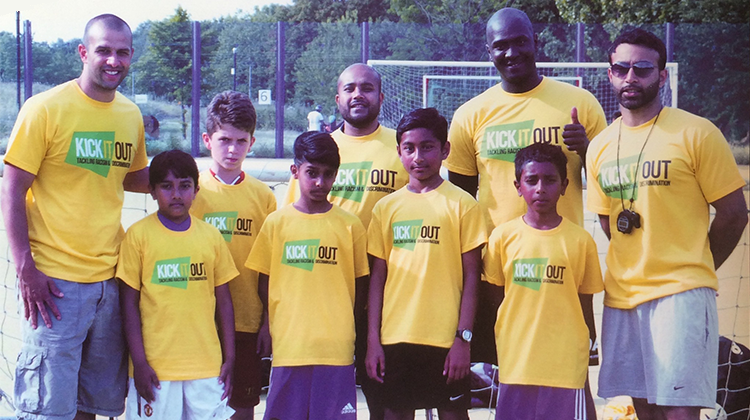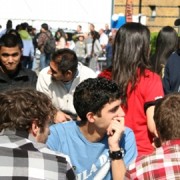Growing up in Stepney, Anwar Uddin was always keenly aware of how different he was to other young up-and-coming footballers, a fact which didn’t change after he broke into playing professionally.
Uddin, the first UK pro footballer of Bangladeshi origin, says: “I’ve never come across another Asian player. I grew up looking up to Gary Lineker. If Gary Lineker was Bangladeshi, I’d be like: ‘Wow, there’s someone that looks like me and has a name that’s not English that’s playing football. I want to do that.’”
After a career of playing for teams including West Ham, Barnet and Dagenham, and Redbridge, Uddin is now committed to bringing football to his community in Tower Hamlets – a borough where one third of the population are Bangladeshi.
Uddin is all too aware of how cultural differences can make integrating into football in East London a daunting task for many local Bangladeshis:
“There’s a culture clash. There’s women, alcohol and gambling. These are synonymous with football culture. If you go into an environment like that and you’re a young Muslim boy, your religion isolates you,” he says.
“If you’re a young Asian kid and you want to make it in the game, in a changing room with 25 men who think you’re weird because you don’t drink, you’re not in an environment where you can get the best out of yourself.”

Anwar Uddin (far left) with the Sporting Bengal football team Pic: Bangladesh Football Association
Uddin’s experiences of how difficult it can be for aspiring Asian footballers have led to him to take over as first team manager of Sporting Bengal, a semi-professional team in his home neighbourhood of Mile End, which aims to promote the representation of Bangladeshi people in football.
“For the last five years we’ve finished rock bottom. This season we’re a mid-table team. We’re four points away from our best ever points tally in our history, we’ve had a great FA Vase run, and we’ve done the double over Tower Hamlets, our local rivals. It’s been a great season but I think we could have done even better. It’s all down to the professionalism,” says Uddin.
The Bangladeshi team manager believes that his history of playing football professionally is the key to taking Sporting Bengal to the next level. “Obviously, it’s not all about me, but I’ve had the experience of working in professional football. That’s integral to getting this level of professionalism,” he says.
Uddin was an ambassador for the Bangladesh Football Association before taking over as first team manager and played a big part in setting up Sporting Bengal’s community-inspired youth academy.
“Three years ago I started the academy. I just got some balls and some bibs, made some flyers and started doing some sessions at Mile End Stadium. Three years later, we’ve got 120 kids that attend every Tuesday and an academy where we’ve produced four or five players that have gone on to have trials or even to play at academies like West Ham, Norwich or Dagenham.”
Uddin says that his inspiration for setting up the academy came from the belief that if he had had similar opportunities, he could have made it to the very top.
“My football education was on the streets and I made it to the Premier League. If the academy was in place when I was living in Stepney Green in the early 90s, who knows?”
Uddin believes that the lack of notable Asian players at the top levels of English football is responsible for the under-representation of Asian people at all levels of the game. He aims to use his historic playing career in tandem with Sporting Bengal’s academy to tackle this.
“The lack of a role model is huge. It’s up to people like myself and clubs like Sporting Bengal to be a positive representation of the community. In Stepney, I lived across the road from the academy. I grew up there and I made it. So there’s no reason why anyone else can’t.”
Underlying racism and a lack of cultural understanding in football discourages many Asian players from getting involved in the game, says Uddin.
“Racism is [a] massive [reason] as to why there aren’t many Asian players. It’s a problem that Sporting Bengal faces as a team of Asian players who only started the team because they wanted a safe environment where they could play at a decent level. It’s about perseverance. When I heard offensive words in the changing rooms when I was on trial, I could have just left and not come back. People were making fun of me. People didn’t understand my culture or my religion. But I went back and I’ve ended up playing at Wembley in front of thousands of people because I persevered.”
Having played for previously played for top-level East London teams, Uddin has provided Sporting Bengal with links to a number of professional clubs:
“I’ve always tried to help Sporting Bengal with my professional networks. As good as the enthusiasm is, if you don’t have the right mindset and the right guidance then you won’t get anywhere. The foundations are now in place for the club to flourish.”
Sporting Bengal was started and is supported by volunteers, which Uddin believes is integral to establishing a football team at this level:
“It’s really brought the club off the ground. They’re doing it just because they didn’t have anything like it so they missed all of their big opportunities. Now, if you’re Asian and you want to play football, you’re not going to miss out because it’s all in place.”
The Bangladesh Football Association, who run Sporting Bengal, are thrilled with Uddin’s impact since first getting involved with the club. The association’s Vice Chairman, Imrul Gazi, explains: “Anwar looks to nurture talent and give them the opportunity to play at higher levels, which is why we got him on board. Professionalism is his key word. We’d like to see more players of Bangladeshi origin represented in football.”
“He has an affiliation to the club and the local community because it’s where he grew up. He’s an inspiration to many youngsters in the Tower Hamlets and Bangladeshi communities. He shows where you can get to if you put the work in.”
“He’s a breath of fresh air for Sporting Bengal,” continues Gazi, “He’s really changed the whole attitude.”




